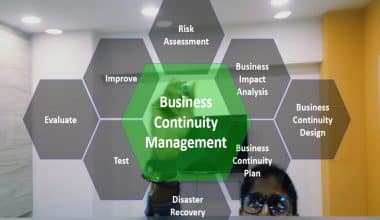Running a small business isn’t easy, especially if things change on a daily basis, such as consumer wants and new technologies. Hence, the purpose of this article is to assist you in overcoming the challenges of running a small business by using the best software and keeping track of your finances with journal management.
Small Business Management
The process of organizing and organizing all parts of a small business, whether it’s managing your staff, suppliers, business finances, a roadmap, or everyday chores, is referred to as small business management.
Small enterprises, unlike major organizations, have restricted finances, significantly less bureaucracy, and may only serve a particular geographic area. They’re frequently concerned with offering excellent customer service and developing better products and services through creativity and innovation.
Small business management is also organizing all elements of the firm to make sure the project expands and attains results, from starting a business to identifying financial requirements, managing personnel, supervising marketing, advertising, and handling your own time.
The following are ten points to note about running a small business:
#1. Make a Business Strategy
Describe your company’s goals and aims as well as a short summary of your company and its products or services, to produce a successful business plan. Add up information on the market you’re intending to join, as well as your sales strategy and financial forecasts. Constantly monitor your company objectives to identify what has improved, what has been accomplished, and what needs to be altered.
#2. Keep Your Personal And Business Money Different.
Because your personal and business taxation are computed differently, you’ll need to create different private accounts for business dealings only.
#3. Calculate The Amount Of Money You’ll Need.
Since you’re launching a new company, the most important thing to consider is how to fund the daily finances. If you choose personal and angel investment, or government grants, it’s critical to understand the benefits and drawbacks of each financing method, as well as the guidelines used to assess your company.
#4. Employ The Correct Personnel
Unless you want your company to succeed, you need to recruit staff that is ambitious, high-energy, and willing to learn rather than just searching for a fast buck. As a small sole proprietor, you must understand how to keep good staff by giving benefits.
#5. Employees Should Be Trained
Even though you recruit the brightest humans on the planet, it will take a while for them to learn the techniques of your company and find out how to hold things together to meet long-term objectives. This is the reason why proper employee training is critical for a small firm. Build a training strategy that will help your staff feel more skilled and in control of their careers.
#6. Maintain a Close Eye on Your Money
It’s simple to keep track of funds coming in and out of a new business while you’re just getting started. This chore, though, can become a headache as your company grows. This is the reason you should either employ a complete in-house accountant or purchase simple accounting technology that can help you keep a record of your accounts and save money.
#7. Make A Marketing Investment.
Smaller companies must work their way in front of customers, offer them anything significant, and also get them to attend to their presentation in a world wherein companies are currently fighting for customers’ interests. Prior to actually deciding on a marketing system that allows best for you and your company, investigate the many small business branding and promotion possibilities.
#8. Assign With Confidence
Small business persons must be able to handle the situation effectively. Delegating work to those fantastic people you’ve recruited and educated is an important tool for controlling your time, particularly for jobs you don’t particularly enjoy or aren’t particularly excel at.
What Are The Advantages Of Managing A Small Business?
Running a business is time-consuming and expensive, still, it helps build a good product and impact the local economy. You already have the capacity to alter lives and make goods that enrich two very different people, the individual & community as a small-business entrepreneur.
The Most Important Advantages of Small Businesses
- Small businesses are thus the backbone of the economy, producing jobs and fueling development.
- Individuals and communities gain from entrepreneurialism. Running a business might provide you with a chance to enhance your career and realize your maximum capabilities.
- Starting a business is both tough and profitable. On the side, you also have the freedom to establish your own hours, work on new projects, and develop in your field.
- Small businesses can help you develop your personal reputation, create local jobs, and make a difference in society. On the other side, you bear a great deal of responsibility.
- You must, therefore, discover a means to convert your concepts into viable products or services as an entrepreneur. This necessitates a well-defined guideline as well as good project management abilities.
Small-Business Management’s Importance
A small business can be started by anyone, but only a few can take it to the next level. As a result, the value of small-business management cannot be understated. The significance of small business management is outlined below.
This procedure also allows you to gain a better understanding of your company. You learn to know your customers so you can fulfill their needs. Also, you have to develop the skills necessary to communicate openly with your team, lead a successful change process, and achieve organizational objectives over time.
When done correctly, it can aid in the development of better products, increase brand recognition, and the most cost-effective reach of your primary audience.
Strong leadership abilities aren’t enough for good management. Shareholders, suppliers, and potential partners are all relationships that great businessmen cultivate and control. They also have an open mind when it comes to implementing new technology in order to boost production and efficiency. They know the time to take risks and when to admit when they’ve made a mistake.
The Best Small Business Management Software
If you are going for the app, you need to go for the best ones. When you use the right or best tool for your business management, you don’t have anything else to worry about. Here are some of them with their features:
#1. nTask
This is the best business project management software. You may obtain a complete perspective of what’s upcoming in your project lifecycle with nTask. Build and maintain your projects using a logical approach that allows you to add items as the project progresses.
They use it as a to-do list tool, assigning tasks to team members in real-time and making roles clear. Also, they adjust task repetition to an interval of your choice to regularly repeat tasks.
Additionally, perform effective group meetings with a sophisticated native meeting management solution that allows you to fine-tune the details of your meetings. They generate and correlate issues with your projects, then use smart issue measures like severity and priority to fix them before they become a problem. Lastly, by recording risks earlier in the project lifecycle, you may protect your project from potential hazards.
There are three different plans available with nTask:
- Free Plan: Unlimited tasks, meetings, timesheet reporting, and workspaces are all included in the free plan.
- Premium plan starts at $3 per month and includes unlimited projects and Gantt Charts.
- Business Plan: Starting at $8 per month, you get limitless risk management and custom fields.
#2. FreshBooks
When it comes to financial accounting, FreshBooks is one of the top small business management software. FreshBooks delivers a fast and dependable solution for making rapid invoices, managing spending, and much more, thanks to its comprehensive accounting capabilities. The tool is also available on a subscription basis, with prices starting at $15 per month. All options include a 30-day free trial. Lastly, is the best business financial management software.
Characteristics of Freshbooks
- Expense tracking is one of the most important features.
- Keeping track of time
- Invoicing
- Estimated costs
- Reports on accounting
- Dashboards
- Permissions for each team can be customized.
#3. Chanty
Chanty is designed to improve team cooperation and efficiency across all industries. They allow you to communicate with your team in a variety of ways, including private, public, group, and one-on-one chats. All of your communications, tasks, files, and links are organized in the Team book. Chanty is the best business team collaboration management software.
Characteristics Of Chanty
- Their message history is limitless.
- Conversations are in private, public, groups, and one-on-one
- Integrations
- Voice Calls & messaging
- Task management built-in
- Board of Kanban
To talk about their prices, their basic plan is available for free, and the monthly fee for a business plan is $3 per user.
4. Bit.ai
Bit.ai is a fantastic project business management software/tool for teams of all sizes. Bit also allows you to create engaging documents, organize material in different workspaces and folders, collaborate, and talk in real-time with your team. It even offers a clever search function to help you locate what you’re looking for quickly.
Highlights include:
- Collaboration in real-time
- There are over 100 integrations.
- Workplaces that are smart
- Templates that are fully responsive
- Tracking of documents
#5. Timely
Whether you bill for it or not, realizing how your company spends time is essential. Timely automates the time tracking process by automatically documenting everything your staff does. It drastically decreases time management expenses while also enhancing the efficiency of reporting and billing.
Highlights include:
- Automated timekeeping
- Dashboards for projects that are updated in real-time
- Reporting that is sophisticated and user-friendly
- Rates by the hour, capacity, and overtime
#6. HubSpot CRM (Customer Relationship Management)
Individuals, small businesses, and corporations can use HubSpot as an all-in-one CRM solution. While HubSpot is most known for its email marketing software, it also offers a suite of marketing, sales, customer support, and operations capabilities, ranging from email workflows to a custom website builder, allowing you to manage your entire organization in one location. All of your teams can work from HubSpot’s database and collaborate on projects, campaigns, and tasks because it’s an all-in-one solution.
Highlights include:
- Sync your data across all of your teams
- Create your own pages and websites using this page and website builder.
- Workflows and forms for email marketing
- Ticketing methods for customer service
- Reports and statistics on sales
- Software for managing customer relationships
#7. iBE.net
iBE.net is a good alternative for mid-sized businesses as a business management software/company management system because it includes expense monitoring, invoice reports, CRM support, and easy project connection. It’s widely useful in the consulting, marketing, and management fields, as well as other technical fields. It’s as if you can fit your entire company into the palm of your hand.
Highlights include:
- Create your own dashboards to suit your needs.
- Use reports that have already been in use.
- Create invoices in a matter of seconds.
- With essential insights, visualize, analyze, and organize your data.
You can also read business software for more knowledge on tools for your business.
Journal Of Small Business Management
According to Wikipedia, “The International Council for Small Businesses (ICSB) publishes the Journal of Small Business Management, a peer-reviewed academic journal published quarterly by Taylor & Francis on behalf of the ICSB and distributed in over 60 countries.” The inaugural issue of the journal appeared in February 1963. It also covers every facet of running a small business and entrepreneurship. However, this journal focuses solely on how to manage your small business. Continue reading to get the best one for your business.
Here are some of the small business management journal
The Academy of Management Annals
The Academy of Management has been publishing since 2017. The journal’s business management purpose is to give up-to-date, in-depth evaluations of the most recent advances in a variety of management topics. Each year’s volume includes important and perhaps controversial research assessments authored by notable academics on a variety of research areas. Articles in the Annals synthesize and/or dispute accepted assumptions and conceptions, point out faults and factual inaccuracies, spark debate, and suggest future research directions. The Annals publishes research evaluations aimed at academic management scholars and practitioners in related domains such as organizational sociology and psychology.
Accounting And Business Research
Accounting and Business Research publishes publications that make a significant and unique addition to the field of accounting and business research. Papers can be about any aspect of accounting, particularly company governance, auditing, and taxation. Accounting, instead of (company) finance or general management, must be the primary objective. Authors can use numerical or analytical methodologies and use a theoretical or empirical approach. They might want to help develop and comprehend the role of accounting in the business world.
Publications should be scholarly, but also structured in a style that allows a diverse variety of academics and, if applicable, practitioners to understand them. Reducing needless words, numbers, or symbols, the presentation should be as beautiful and efficient as feasible.
Accountability In Research
The journal Accountability in Research for business management is in dedication to the exploration and critical analysis of techniques and institutions that promote research integrity. It offers an interdisciplinary, international conference for the advancement of ethics, methods, standards, regulations, and ideas in order to promote ethical research and improve the legitimacy of research findings. This journal for small business management aims to publish research that contributes significantly to the corpus and increases knowledge of research accountability and integrity. This journal for small business management does not promote studies that essentially repeat earlier work or are limited in generalizability, with a few exceptions.
While the magazine aims to promote research accountability and integrity, it is not a venue for resolving serious concerns about individual researchers, academic institutions, publications, or funding bodies.
All manuscripts are subjected to an initial examination by the Editor and, if found eligible for further evaluation, peer review by anonymous professional reviewers. All peer review is done anonymously, and submissions are made through ScholarOne Manuscripts.
The following sorts of articles are accepted by Accountability in Research:
- Original Content
- Message to the Editor
- Commentary
Articles should
- Not exceed 6,000 words.
- Should include a 200-word unstructured abstract.
- Between 2 and 5 keywords should be included.
The AAG Review Of Books
This is a publication that publishes reviews of books written by the American Association of Geographers. They launched the AAG Review of Books in 2013 as a quarterly online journal (AAG). The AAG Review of Books was established to house scholarly book reviews that were formerly published in the American Association of Geographers’ flagship journals, Annals of the American Association of Geographers and The Professional Geographer.
The AAG Review of Books is a collection of scholarly reviews of recent books that are either geographically sensitive or are examined and interpreted via the various lenses that geography provides. Geographic studies continue to rely on books, which come in a variety of media, not only as a means of disseminating ideas and research but also as sources of inspiration that can originate from (well) outside of geographical regions, such as poetry, fiction, and visual imagery. Book reviews, review essays, and book review forums are among the topics covered.
Taylor & Francis, Inc., 530 Walnut Street, Suite 850, Philadelphia, PA 19106; Taylor & Francis, Inc., 530 Walnut Street, Suite 850, Philadelphia, PA 19106.
Accounting Forum
The Accounting Forum publishes authoritative yet accessible articles that expand our understanding of theory and practice in all areas of accounting and related subjects and invites studies in these areas that take an interdisciplinary approach. This journal for small business management serves as a venue for academic researchers to share their findings on a variety of current challenges and breakthroughs in accounting and associated subjects. The Accounting Forum invites papers that employ both qualitative and quantitative approaches and provide a strong conceptual contribution that goes beyond the topic of the paper.
Accountability, accounting education, accounting information systems, accounting theory, auditing, ethics, financial accounting, governance, management accounting, social and environmental accounting, and taxation are some of our key areas of interest. Every edition of this journal for small business management has participant papers, research notes, and a comments section of similar relevance to practitioners, academics, and students. Authors can also choose to publish their work in this journal with full public access.
Why Is Small Business Management Important?
One of the importance of small business management is that it also allows you to gain a better understanding of your company. Also, you can learn to know your customers so you can fulfill their needs. You develop the skills necessary to communicate openly with your team, lead a successful change process, and achieve organizational objectives over time.
What Is a Small Business Management?
The process of organizing and organizing all parts of a small business, whether it’s managing your staff, suppliers, business finances, roadmap, or everyday chores, is referred to as small business management.
Is Business Management a Hard Job?
Despite the fact that business management is a tough and complex profession to navigate and that there is a great deal to study in preparation for a good management role, you should not neglect this topic.
How Does Business Management Pay?
The average annual compensation for management roles is the highest of the major occupational groupings, at $105,660. According to the Bureau of Labor Statistics, these occupations are projected to increase by five percent by 2029, resulting in the creation of slightly more than 500,000 new jobs.
Why Is Business Management a Good Job?
Good managers are recognized in all sectors of the economy, including industry, nonprofit, and government. Therefore, graduates in business management can find employment in nearly any industry. Even though business management is a vast field and profession, the fundamental skills remain constant. In addition, excellent company managers are in high demand.
What Are Benefits of Small Business?
Here are some of the benefits of small business:
- Small businesses are the backbone of the economy, producing jobs and fueling development.
- Individuals and communities gain from entrepreneurialism.
- Starting a business is both tough and profitable.
How Do You Successfully Manage a Small Business?
You can run your business successfully through:
- Make a business strategy.
- Keep your personal and business money different.
- Calculate the amount of money you’ll need.
- Employ the Correct Personnel
- Employees Should Be Trained
- Maintain a Close Eye on Your Money
Related Articles
- Business Software: 27+ Best Software & Programs For Your Small Businesses
- PUBLIC FINANCIAL MANAGEMENT: ALL YOU SHOULD KNOW (+DETAILED GUIDE)
- ACCOUNTING PROCESS: Understanding the 8 Steps in the Accounting Cycle
- 6 Tools For Running a Successful Startup
- SMALL BUSINESS MANAGEMENT: Best Software for Small Business Management(+Quick Guide &Tips)
- CONDO VS HOUSE: Everything You Need To Know
- A CONTRACT FOR DEED: Definition & How It Works 2023






